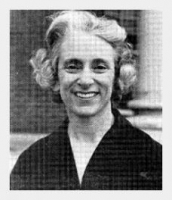阅读bā bā lā ·W. tǎ qí màn Barbara W. Tuchman在历史大观的作品!!! | |||
tā xiě chū liǎo 20 shì jì zuì hǎo de lì shǐ zuò pǐn。 yǐ《 bā yuè pào huǒ》 hé《 shǐ dí wēi yǔ měi guó zài zhōng guó de jīng yàn》 liǎng cì huò dé pǔ lì cè jiǎng。 cóng 1956 nián dào 1988 nián, tā gòng chū bǎn liǎo 10 bù zuò pǐn :
《 shèng jīng yǔ jiàn》( BibleandSword,1956)、《 qí mò 'ěr màn diàn bào》( TheZimmermannTelegram,1958)、《 bā yuè pào huǒ》( TheGunsofAugust,1962)、《 jiāo 'ào de chéng bǎo》( TheProudTower,1966)、《 shǐ dí wēi yǔ měi guó zài zhōng guó de jīng yàn》( StilwellandtheAmericanExperienceinChina,1971)、《 lái zì zhōng guó de hán jiàn》( NotesfromChina,1972)、《 yáo yuǎn de jìng zǐ》( ADistantMirror,1978)、《 shí jiàn lì shǐ》( PracticingHistory,1981)、《 “ huāng táng ” jìn xíng qū》( TheMarchofFolly,1984)、《 dì yī cì jìng lǐ》( TheFirstSalute,1988)。
wǒ de mù biāo shì yào shǐ lì shǐ zuò pǐn lìng dú zhě zháomí bìng qiě xiàng wǒ nà yàng duì tí cái jī dòng bù yǐ、 zhè yàng de qián tí shì shǒu xiān lìng zì jǐ zháomí bìng yòu yī zhǒng yào chuán dá mó zhòu de nán yǐ kàng jù de chōng dòng。
Tuchman focused on writing popular history. Her clear, dramatic storytelling covered topics as diverse as the 14th century and World War I, and sold millions of copies.
Life and careerTuchman was the daughter of the banker Maurice Wertheim. She was a first cousin of New York district attorney Robert M. Morgenthau, a niece of Henry Morgenthau, Jr. and granddaughter of Henry Morgenthau Sr., Woodrow Wilson's Ambassador to the Ottoman Empire. She received her Bachelor of Arts from Radcliffe College in 1933.
She married Lester R. Tuchman, an internist, medical researcher and professor of clinical medicine at Mount Sinai School of Medicine, in 1939; they had three daughters (one of whom is Jessica Mathews).
From 1934 to 1935 she worked as a research assistant at the Institute of Pacific Relations in New York and Tokyo, and then began a career as a journalist before turning to books. As a journalist she was the editorial assistant for The Nation and an American correspondent for the New Statesman in London, the Far East News Desk, and the Office of War Information (1944–45).
Tuchman was a trustee of Radcliffe College and a lecturer at Harvard University, University of California, and the U.S. Naval War College. A tower of Currier House, a residential division of Harvard College was named in her honor.
Tuchman's LawDisaster is rarely as pervasive as it seems from recorded accounts. The fact of being on the record makes it appear continuous and ubiquitous whereas it is more likely to have been sporadic both in time and place. Besides, persistence of the normal is usually greater than the effect of the disturbance, as we know from our own times. After absorbing the news of today, one expects to face a world consisting entirely of strikes, crimes, power failures, broken water mains, stalled trains, school shutdowns, muggers, drug addicts, neo-Nazis, and rapists. The fact is that one can come home in the evening, on a lucky day, without having encountered more than one or two of these phenomena. This has led me to formulate Tuchman's Law, as follows: "The fact of being reported multiplies the apparent extent of any deplorable development by five- to tenfold (or any figure the reader would care to supply)."
Awards and honorsTuchman twice won the Pulitzer Prize for General Non-Fiction, first for The Guns of August in 1963, and again for Stilwell and the American Experience in China in 1972. She won a U.S. National Book Award in History[a] for the first paperback edition of A Distant Mirror in 1980.
Also in 1980 the National Endowment for the Humanities (NEH) selected Tuchman for the Jefferson Lecture, the U.S. federal government's highest honor for achievement in the humanities. Tuchman's lecture was entitled "Mankind's Better Moments."
Publication
BooksThe Lost British Policy: Britain and Spain Since 1700 (1938)
Bible and Sword: England and Palestine from the Bronze Age to Balfour (1956)
The Zimmermann Telegram (1958)—The Zimmermann Telegram in early 1917 was a key incident involving Germany and Mexico that helped provoke the U.S. into entering World War I.
The Guns of August (1962) details the military decisions and actions that occurred leading up to and during the first month of World War I. It is primarily what established her reputation. During the Cuban Missile Crisis, John F. Kennedy advised the EXCOMM to read this book. Reprinted several times in the 1980s as August 1914.
The Proud Tower: A Portrait of the World Before the War, 1890–1914 (1966)—Covers the hesitant rise of U.S. imperialism, anarchist assassinations, socialism, communism, and the devolution of the 19th century order in Europe and North America.
Stilwell and the American Experience in China (1970)—A biography of Joseph Stilwell.
Notes from China (1972) (about Tuchman’s own visit there)
A Distant Mirror: The Calamitous Fourteenth Century (1978)—Examines the era of 1340–1400 through political, military, and social lenses, taking nobleman Enguerrand VII de Coucy as its central figure. Themes include the folly of chivalry and the tragedy of war.
Practicing History (1981)—Selected essays, published between 1935 and 1981, on historical writing, political ambition, and the importance of reading history.
The March of Folly: From Troy to Vietnam (1984)—A meditation on the historical recurrence of governments pursuing policies evidently contrary to their own interests. In addition to the two historical events referenced in the title, discusses the Catholic Church of the late Renaissance inciting the Protestant rebellion and Great Britain provoking the Americans to revolt.
The First Salute: A View of the American Revolution (1988). (The title refers to the St. Eustatius "flag incident" of 16 November 1776.)
Other worksAmerica's Security in the 1980s (1982)—Photographed with Laurence Martin for this Christopher Bertram book.
The Book: A lecture sponsored by the Center for the Book in the Library of Congress and the Authors’ League of America, presented at the Library of Congress October 17, 1979 (1980)
